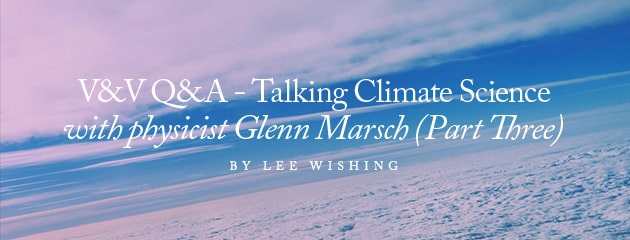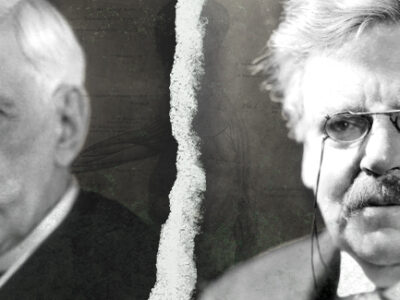
Editor’s note: As we move on from Snovember—a lengthy stretch of below average temperatures across the country—and into December, we thought it would be a perfect time to discuss the heated topic of climate science. This is the third and final part in a series of discussions with Grove City College physicist Dr. Glenn Marsch regarding global warming.
V&V: Dr. Marsch, in our last climate discussion we talked about climate computer models. This time, we’d like to talk about carbon dioxide levels. Are they higher now and, if so, what should we do about cutting them?
Marsch: Carbon dioxide levels are much higher than they’ve been for a long time, according to the Vostok and EPICA Projects, which involved analyzing Antarctic ice cores. These studies show a couple of things. One, where they saw extra carbon dioxide in the atmosphere, it did not precede warming, it actually followed it. Second, they showed that there’s certainly more CO2 in the atmosphere now than there has been in the last 700,000 years; and, in fact, not by just a little bit. The CO2 concentration in the atmosphere is now just under 400 parts per million (ppm). That’s about 25 percent higher than we think it was in 1960, and over twice as high as it was during recent glacial maxima. Temperatures, though, are only slightly higher.
V&V: That seems surprising. What do we know about temperatures?
Marsch: Our understanding about how CO2 leads to temperature change is incomplete.
V&V: Much of the debate today focuses on whether human beings are responsible for increased carbon dioxide levels and whether increased carbon dioxide levels cause a dangerous spike in temperatures. What do you make of these questions?
Marsch: I cannot speak as a published author in this field, but I am trying to speak as a physicist and somebody who is generally interested in geology and who cares deeply about how the scientific method is portrayed to the public. I look at this phenomenon and it seems certain that human activity has increased the CO2 level, but the global average temperature has not increased quite the way many people thought it would. And this is a problem. There needs to be what is sometimes called in science “epistemological humility.” If global temperature increases by a degree Celsius that is going to be, certainly, less problematic than if our temperatures decrease by three to six degrees Celsius as they did during past ice ages. The worst thing we can do is destroy the economy of a nation with unreasonable environmental regulation, which affects the poor most of all.
V&V: Let’s look at the larger picture for a moment. In our last discussion you noted that we haven’t experienced a rise in global temperatures since prior to the turn of the 21st century. Is this “hiatus” or pause well-known among the scientific community?
Marsch: Yes. In my opinion, however, it is being downplayed by many in the climate science community. So now their strategy is to understand where the energy trapped by the CO2 went in order to save the hypothesis that man-made CO2 is the main driver of global warming.
V&V: What is being suggested?
Marsch: The idea promoted by many in the climate science community is that carbon dioxide is heating up the earth but that we’re not presently seeing temperature increases in the atmosphere. Therefore, they say, the heat is going somewhere else. Some of the hypotheses suggest the oceans have absorbed that heat. So, in other words, the extra carbon dioxide emitted by humans really is still warming the earth, but the energy it traps is mainly sequestered in the oceans rather than in the atmosphere.
V&V: Is this possible?
Marsch: It’s possible that the energy went elsewhere. Moreover, maybe that heat will be released into the atmosphere one day. But I think we can say that the models didn’t predict the hiatus in global warming. There should be some humility about what models can or cannot tell us and there should be some humility about the certitude with which media organs tell the public what’s going on here.
V&V: What are your thoughts as the political debate continues while at the same time we have scientific uncertainty?
Marsch: It’s true—there is a lot of scientific uncertainty. Yet, even if 100 percent of the scientific community were to say that global warming is a huge problem, and that we must deal with it now, we still must determine what to do—that’s the realm of policy. Should we decarbonize our economy? If we outlaw or stop manufacturing incandescent light bulbs in the U.S., will that have an effect on future global temperatures? If we shut down our coal-fired plants while countries like China and India are electrifying and building more plants, will our actions really help the environment? I think the answer is “very little.” But if we do all of this and put people out of work, then what happens to an economy, to those people?
And this is something, I think, that a lot of folks in the environmental movement don’t get. Burning fossil fuels is not a perfect solution—it has plenty of drawbacks. But I agree with Ross McKitrick that it has been one of the biggest drivers of human prosperity ever. Moreover, I find it unconscionable that people who dwell in wealthy countries want to dictate to folks around the world that they cannot burn fossil fuels. Poorer countries don’t have the leisure to worry about how much carbon they’re putting into the atmosphere. They want clean drinking water, they want better health, and they want the kinds of advantages that people in wealthier countries have. I think that governments of most developing countries are not going to sign any Kyoto-type treaties until that happens. In the meantime, they are emitting more pollution than I’d like, but eventually they’ll be wealthy enough to remediate their problems.
V&V: So, the message to the American people is, “Be careful, we can hurt the poor.”
Marsch: Yes, be careful, for by implementing bad policy, we can hurt the poor and needy.




